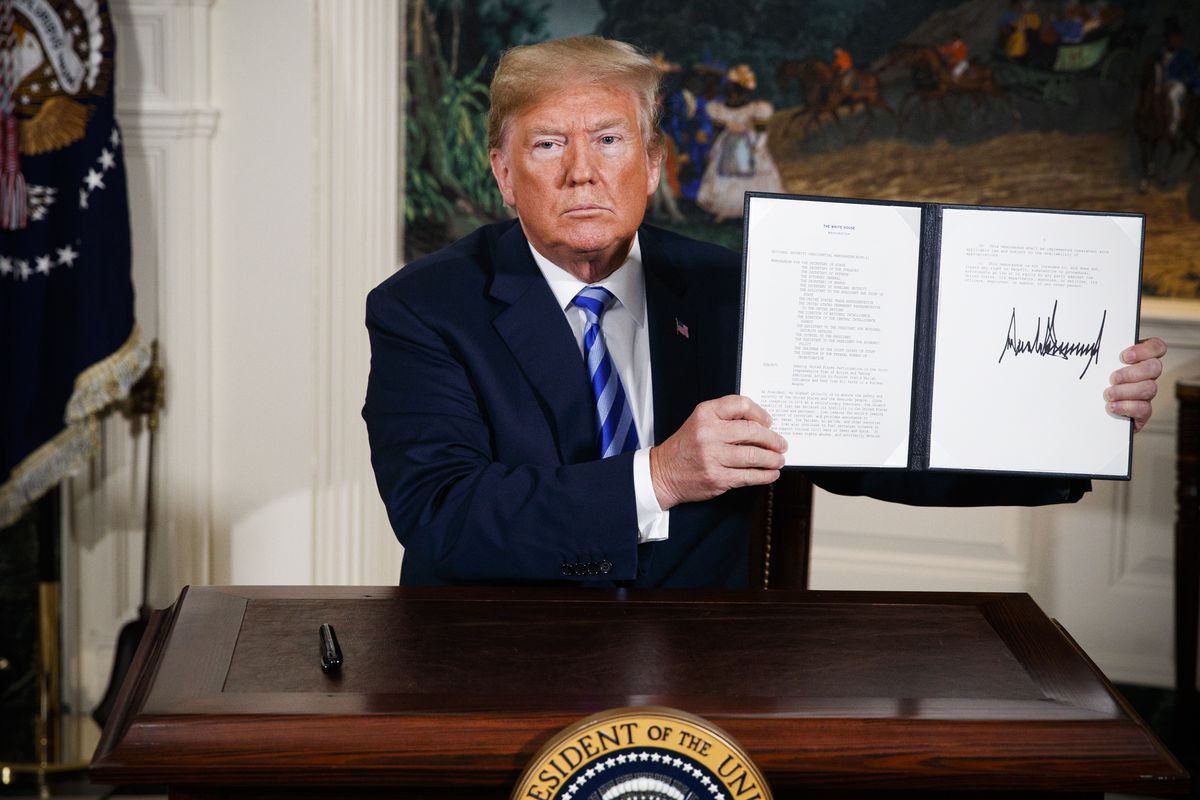By: The Editorial Board – wsj.com – May 9, 2018
Trump can exit because Obama never built U.S. support for the pact.
President Trump on Tuesday withdrew the U.S. from the Iran nuclear deal, rightly calling it “defective at its core.” Yet he also offered Iran a chance to negotiate a better deal if it truly doesn’t want a nuclear weapon. Mr. Trump’s challenge now is to build a strategy and alliances to contain Iran until it accepts the crucial constraints that Barack Obama refused to impose.
The Obama Administration spent years negotiating a lopsided pact that gave Tehran $100 billion of sanctions relief and a chance to revive its nuclear-weapons program after a 15-year waiting period. Instead of cutting off “all of Iran’s pathways to a bomb” as Mr. Obama claimed, the deal delayed the country’s entry into the nuclear club and gave the mullahs cash to fund their Middle East adventurism.
***
Mr. Trump outlined a more realistic strategy in October, promising to work with allies to close the deal’s loopholes, address Tehran’s missile and weapons proliferation, and “deny the regime all paths to a nuclear weapon.” An Iranian nuke would be a modest problem if Iran were a democracy. But the Islamic Republic is no India and has a four-decade history of oppressing its own people, taking foreign hostages and threatening neighbors with extinction.
State Department policy chief Brian Hook spent months shuttling between European capitals to get an agreement to strengthen inspections of suspected nuclear sites, stop Iran from developing ballistic missiles and eliminate the deal’s sunset provisions. Deal signatories China and Russia don’t share U.S. strategic goals in the Mideast, but the Trump Administration’s reasonable presumption is that Britain, France and Germany do.
Mr. Trump’s case for fixing the deal was bolstered last week when Israeli Prime Minister Benjamin Netanyahu revealed intelligence that Iran repeatedly lied to U.N. weapons inspectors about past nuclear activity. As Mr. Trump noted Tuesday, Tehran doesn’t allow inspectors access to many military sites. Mr. Netanyahu also revealed that Iran hid an extensive nuclear archive, which would still be secret if not for Israeli intelligence.
Regimes that have peaceful intentions don’t behave this way. When South Africa decided to denuclearize in the early 1990s, President F.W. de Klerk ordered the destruction of all sensitive technical and policy documents and gave U.N. inspectors “anytime, anywhere” access to inspect nuclear facilities. In Moammar Gadhafi’s case, U.S. officials physically removed sensitive nuclear-weapons documents, uranium and equipment from Libya.
Yet Britain, France and Germany waved away Israel’s intelligence, and European Union chief diplomat Federica Mogherini said the evidence doesn’t “put in question Iran’s compliance” with the nuclear deal. The Europeans may think they can maintain commercial dealings with Iran and wait out Mr. Trump through the 2020 election.
This is risky because Mr. Trump said in the next 90 to 180 days the U.S. will reimpose “the highest level of economic sanction” on Iran’s energy and automotive industries, ports, shipbuilding and more. The sanctions will cut Iran off from the global financial system even as the regime faces labor strikes and political protests amid a struggling economy. The country may find fewer buyers for its oil exports, and the rial has plunged.
Iran may try to drive a wedge between the U.S. and Europe to keep euros flowing to Tehran. But the U.S. has leverage. As Mr. Trump said Tuesday, “Any nation that helps Iran in its quest for nuclear weapons could also be strongly sanctioned by the United States.” Attempting to isolate the U.S. could present European companies with an eventual choice of doing business with the U.S. or Iran. The smarter play is for Europe to persuade Iran that to maintain commerce with the world it should renegotiate the pact.
***
Mr. Obama issued his own broadside Tuesday against withdrawal, but then he made it easier for Mr. Trump by never winning domestic support for the deal. He refused to submit it for Senate approval as a treaty, which would have had the force of law. Mr. Trump is walking away from Mr. Obama’s personal commitment to Iran, not an American commitment.
But this is also a warning to Mr. Trump that his Administration has more work to do to execute his Iran strategy. This means building bipartisan support in Congress for sanctions; diplomacy to deter Iran’s adventures in Syria and elsewhere in the Middle East; and more diplomacy with Europe to fix the nuclear deal’s fatal weaknesses.
Perhaps the best part of Mr. Trump’s remarks came at the end when he spoke to “the long-suffering people of Iran.” He said “the people of America stand with you” and made the offer of better relations and a more prosperous future if their leaders will shed their destructive nuclear and imperial dreams. Political change in Tehran remains the best hope for a non-nuclear Iran.
To see this article, click read more.
Source: After Obama’s Iran Deal
 Listen Online
Listen Online Watch Online
Watch Online Find a Station in Your Area
Find a Station in Your Area









 Listen Now
Listen Now Watch Online
Watch Online
